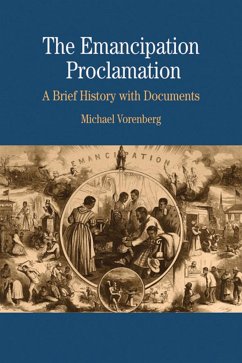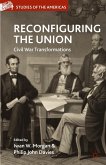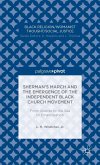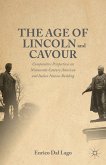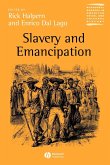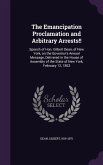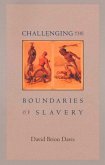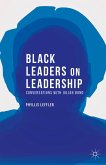- Broschiertes Buch
- Merkliste
- Auf die Merkliste
- Bewerten Bewerten
- Teilen
- Produkt teilen
- Produkterinnerung
- Produkterinnerung
Within months of Lincoln's 1860 election, the Confederate states seceded and the Civil War began. In his inaugural address Lincoln vowed not to interfere with slavery and even endorsed a constitutional amendment to protect it. Yet two years later Lincoln signed the Emancipation Proclamation, freeing slaves in the rebellious states, transforming the goals of the war, and setting the stage for national emancipation. In this volume, Michael Vorenberg reveals the complexity of the process by which African-Americans gained freedom and explores the struggle over its meaning. The introduction…mehr
Andere Kunden interessierten sich auch für
![Reconfiguring the Union Reconfiguring the Union]() Reconfiguring the Union41,99 €
Reconfiguring the Union41,99 €![Sherman's March and the Emergence of the Independent Black Church Movement: From Atlanta to the Sea to Emancipation Sherman's March and the Emergence of the Independent Black Church Movement: From Atlanta to the Sea to Emancipation]() L. H. WhelchelSherman's March and the Emergence of the Independent Black Church Movement: From Atlanta to the Sea to Emancipation41,99 €
L. H. WhelchelSherman's March and the Emergence of the Independent Black Church Movement: From Atlanta to the Sea to Emancipation41,99 €![The Age of Lincoln and Cavour The Age of Lincoln and Cavour]() Enrico Dal LagoThe Age of Lincoln and Cavour41,99 €
Enrico Dal LagoThe Age of Lincoln and Cavour41,99 €![Slavery and Emancipation Slavery and Emancipation]() Slavery and Emancipation74,99 €
Slavery and Emancipation74,99 €![The Emancipation Proclamation and Arbitrary Arrests!!: Speech of Hon. Gilbert Dean, of New York, on the Governor's Annual Message, Delivered in the Ho The Emancipation Proclamation and Arbitrary Arrests!!: Speech of Hon. Gilbert Dean, of New York, on the Governor's Annual Message, Delivered in the Ho]() Dean Gilbert 1819-1870The Emancipation Proclamation and Arbitrary Arrests!!: Speech of Hon. Gilbert Dean, of New York, on the Governor's Annual Message, Delivered in the Ho30,99 €
Dean Gilbert 1819-1870The Emancipation Proclamation and Arbitrary Arrests!!: Speech of Hon. Gilbert Dean, of New York, on the Governor's Annual Message, Delivered in the Ho30,99 €![Challenging the Boundaries of Slavery Challenging the Boundaries of Slavery]() David Brion DavisChallenging the Boundaries of Slavery36,99 €
David Brion DavisChallenging the Boundaries of Slavery36,99 €![Black Leaders on Leadership Black Leaders on Leadership]() Phyllis LefflerBlack Leaders on Leadership41,99 €
Phyllis LefflerBlack Leaders on Leadership41,99 €-
-
-
Within months of Lincoln's 1860 election, the Confederate states seceded and the Civil War began. In his inaugural address Lincoln vowed not to interfere with slavery and even endorsed a constitutional amendment to protect it. Yet two years later Lincoln signed the Emancipation Proclamation, freeing slaves in the rebellious states, transforming the goals of the war, and setting the stage for national emancipation. In this volume, Michael Vorenberg reveals the complexity of the process by which African-Americans gained freedom and explores the struggle over its meaning. The introduction summarizes the history and national debate over slavery from the country's founding through the Civil War and beyond, and more than 40 documents and images give voice to the range of actors who participated in this vital drama. In addition, essays by contemporary historians Ira Berlin and James McPherson argue the question of who freed the slaves.
Hinweis: Dieser Artikel kann nur an eine deutsche Lieferadresse ausgeliefert werden.
Hinweis: Dieser Artikel kann nur an eine deutsche Lieferadresse ausgeliefert werden.
Produktdetails
- Produktdetails
- Verlag: Bedford/St. Martin's / Macmillan Education
- 1st ed. 2010
- Seitenzahl: 192
- Erscheinungstermin: 1. Januar 2010
- Englisch
- Abmessung: 209mm x 141mm x 13mm
- Gewicht: 228g
- ISBN-13: 9780312435813
- ISBN-10: 0312435819
- Artikelnr.: 28241483
- Herstellerkennzeichnung
- Libri GmbH
- Europaallee 1
- 36244 Bad Hersfeld
- gpsr@libri.de
- Verlag: Bedford/St. Martin's / Macmillan Education
- 1st ed. 2010
- Seitenzahl: 192
- Erscheinungstermin: 1. Januar 2010
- Englisch
- Abmessung: 209mm x 141mm x 13mm
- Gewicht: 228g
- ISBN-13: 9780312435813
- ISBN-10: 0312435819
- Artikelnr.: 28241483
- Herstellerkennzeichnung
- Libri GmbH
- Europaallee 1
- 36244 Bad Hersfeld
- gpsr@libri.de
Michael Vorenberg (Ph.D., Harvard University) is associate professor of history at Brown University where he teaches courses on antebellum America, the Civil War and reconstruction, race and law, and American legal and constitution history. Vorenberg's research interests lie at the intersection of three fields in American history: the Civil War era, legal and constitution history, and race and emancipation. He is author of Final Freedom: The Civil War, the Abolition of Slavery, and the Thirteenth Amendment (2001), a finalist for the Lincoln Prize in 2002, as well as numerous essays and articles on topics ranging from Lincoln's plans for the colonization of African Americans to the meaning of rights and privileges under the Fourteenth Amendment.
PART I: THE MAKING AND MEANING OF EMANCIPATION.- PART II: THE DOCUMENTS.- Abraham Lincoln, Cooper Union Address, February 27, 1860.- Abraham Lincoln, Letter to Lyman Trumbull, December 10, 1861.- Abraham Lincoln, Letter to Alexander H. Stephens,.- Alexander H. Stephens, Cornerstone Speech, March 21, 1861.- Abraham Lincoln, First Inaugural, March 4, 1861.- John J. Cheatham, Letter to L. P. Walker, May 4, 1861.- Benjamin Butler, Letter to Winfield Scott, May 24, 1861.- Abraham Lincoln, Letter to Orville Browning, September 22, 1861.- The Pacific Appeal, Editorial on Emancipation, June 14, 1862.- George B. McClellan, Harrison's Landing Letter, July 7, 1862.- Samuel J. Kirkwood, Letter to Henry W. Halleck, August 5, 1862.- Lydia Maria Child, Letter to John G. Whittier, January 21, 1862.- Frederick Douglass, 'The Slaveholders Rebellion,' July 4, 1862.- Abraham Lincoln, Letter to Horace Greeley, August 22, 1862.- Abraham Lincoln, Preliminary Emancipation Proclamation,.- Benjamin R. Curtis, Executive Power, 1862.- Grosvenor Lowrey, Commander-In-Chief, 1862.- Edward D. Marchant, Abraham Lincoln, 1863.- Adalbert Johann Volck, Writing the Emancipation.- Abraham Lincoln, Annual Message to Congress, December 1, 1862.- Abraham Lincoln, Final Emancipation Proclamation, January 1, 1863.- The Pacific Appeal, 'The Year of Jubilee Has Come!' January 3, 1863.- 'The Emancipation Proclamation,' the Cincinnati Daily Enquirer,.- January 3, 1863.- James H. Hudson, Letter to the Pacific Appeal, February 25, 1863.- Harper's Weekly, Sensation among 'Our Coloured Brethren,'.- December 20, 1863.- Thomas Nast, The Emancipation of the Negroes, January 24, 1863.- H. Ford Douglas, Letter to Frederick Douglass, January 8, 1863.- Frederick Douglass, 'Men of Colour, to Arms!,' March 1863.- Sattie A. Douglas, Letter to the Anglo-African, June 20, 1863.- Hannah Johnson, Letter to Abraham Lincoln, July 31, 1863.- Martha Glover, Letter to Richard Glover, December 30, 1863.- Charlotte Forten, 'Life on the Sea Islands,' June 1864.- George E. Stephens, 'The Pay of Coloured Troops,' August 1, 1864.- Spotswood Rice, Letter to Kitty Diggs, September 3, 1864.- Patrick R. Cleburne, Letter to the Commanders of the Army of the.- Tennessee, January 2, 1864.- Congress of the Confederate States of America, 'Address to the.- People of the Confederate States,' January 22, 1864.- Robert E. Lee, Letter to Andrew Hunter, January 11, 1864.- Charleston Mercury, 'Lunacy,' January 13, 1865.- Richmond Examiner, 'Negro Troops,' February 25, 1865.- Harriet Jacobs, Letter to Lydia Maria Child, March 18, 1863.- C. B. Wilder, Testimony before the American Freedmen's Inquiry.- Commission, May 9, 1863.- Noyes Wheeler, 'The Riotous Outbreak in New York,' July 20, 1863.- Abraham Lincoln, Gettysburg Address, November 19, 1863.- Annie Davis, Letter to Abraham Lincoln, August 25, 1864.- Abraham Lincoln, Second Inaugural, March 4, 1864.- Abraham Lincoln, Last Public Address, April 11, 1865.- Edward D. Townsend, Report on Meeting of African Americans with.- Frederick Douglass, Speech in Memory of Abraham Lincoln,.- April 14, 1876.- Thomas Ball, Freedmen's Memorial to Abraham Lincoln, 1876.- Henry W. Herrick, Reading the Emancipation Proclamation in.- the Slaves' Cabin, 1864.- Historians Assess Emancipation.- James M. McPherson, 'Who Freed the Slaves?,' 1996.- Ira Berlin, 'Who Freed the Slaves?: Emancipation and Its Meaning'.
PART I: THE MAKING AND MEANING OF EMANCIPATION.- PART II: THE DOCUMENTS.- Abraham Lincoln, Cooper Union Address, February 27, 1860.- Abraham Lincoln, Letter to Lyman Trumbull, December 10, 1861.- Abraham Lincoln, Letter to Alexander H. Stephens,.- Alexander H. Stephens, Cornerstone Speech, March 21, 1861.- Abraham Lincoln, First Inaugural, March 4, 1861.- John J. Cheatham, Letter to L. P. Walker, May 4, 1861.- Benjamin Butler, Letter to Winfield Scott, May 24, 1861.- Abraham Lincoln, Letter to Orville Browning, September 22, 1861.- The Pacific Appeal, Editorial on Emancipation, June 14, 1862.- George B. McClellan, Harrison's Landing Letter, July 7, 1862.- Samuel J. Kirkwood, Letter to Henry W. Halleck, August 5, 1862.- Lydia Maria Child, Letter to John G. Whittier, January 21, 1862.- Frederick Douglass, 'The Slaveholders Rebellion,' July 4, 1862.- Abraham Lincoln, Letter to Horace Greeley, August 22, 1862.- Abraham Lincoln, Preliminary Emancipation Proclamation,.- Benjamin R. Curtis, Executive Power, 1862.- Grosvenor Lowrey, Commander-In-Chief, 1862.- Edward D. Marchant, Abraham Lincoln, 1863.- Adalbert Johann Volck, Writing the Emancipation.- Abraham Lincoln, Annual Message to Congress, December 1, 1862.- Abraham Lincoln, Final Emancipation Proclamation, January 1, 1863.- The Pacific Appeal, 'The Year of Jubilee Has Come!' January 3, 1863.- 'The Emancipation Proclamation,' the Cincinnati Daily Enquirer,.- January 3, 1863.- James H. Hudson, Letter to the Pacific Appeal, February 25, 1863.- Harper's Weekly, Sensation among 'Our Coloured Brethren,'.- December 20, 1863.- Thomas Nast, The Emancipation of the Negroes, January 24, 1863.- H. Ford Douglas, Letter to Frederick Douglass, January 8, 1863.- Frederick Douglass, 'Men of Colour, to Arms!,' March 1863.- Sattie A. Douglas, Letter to the Anglo-African, June 20, 1863.- Hannah Johnson, Letter to Abraham Lincoln, July 31, 1863.- Martha Glover, Letter to Richard Glover, December 30, 1863.- Charlotte Forten, 'Life on the Sea Islands,' June 1864.- George E. Stephens, 'The Pay of Coloured Troops,' August 1, 1864.- Spotswood Rice, Letter to Kitty Diggs, September 3, 1864.- Patrick R. Cleburne, Letter to the Commanders of the Army of the.- Tennessee, January 2, 1864.- Congress of the Confederate States of America, 'Address to the.- People of the Confederate States,' January 22, 1864.- Robert E. Lee, Letter to Andrew Hunter, January 11, 1864.- Charleston Mercury, 'Lunacy,' January 13, 1865.- Richmond Examiner, 'Negro Troops,' February 25, 1865.- Harriet Jacobs, Letter to Lydia Maria Child, March 18, 1863.- C. B. Wilder, Testimony before the American Freedmen's Inquiry.- Commission, May 9, 1863.- Noyes Wheeler, 'The Riotous Outbreak in New York,' July 20, 1863.- Abraham Lincoln, Gettysburg Address, November 19, 1863.- Annie Davis, Letter to Abraham Lincoln, August 25, 1864.- Abraham Lincoln, Second Inaugural, March 4, 1864.- Abraham Lincoln, Last Public Address, April 11, 1865.- Edward D. Townsend, Report on Meeting of African Americans with.- Frederick Douglass, Speech in Memory of Abraham Lincoln,.- April 14, 1876.- Thomas Ball, Freedmen's Memorial to Abraham Lincoln, 1876.- Henry W. Herrick, Reading the Emancipation Proclamation in.- the Slaves' Cabin, 1864.- Historians Assess Emancipation.- James M. McPherson, 'Who Freed the Slaves?,' 1996.- Ira Berlin, 'Who Freed the Slaves?: Emancipation and Its Meaning'.

